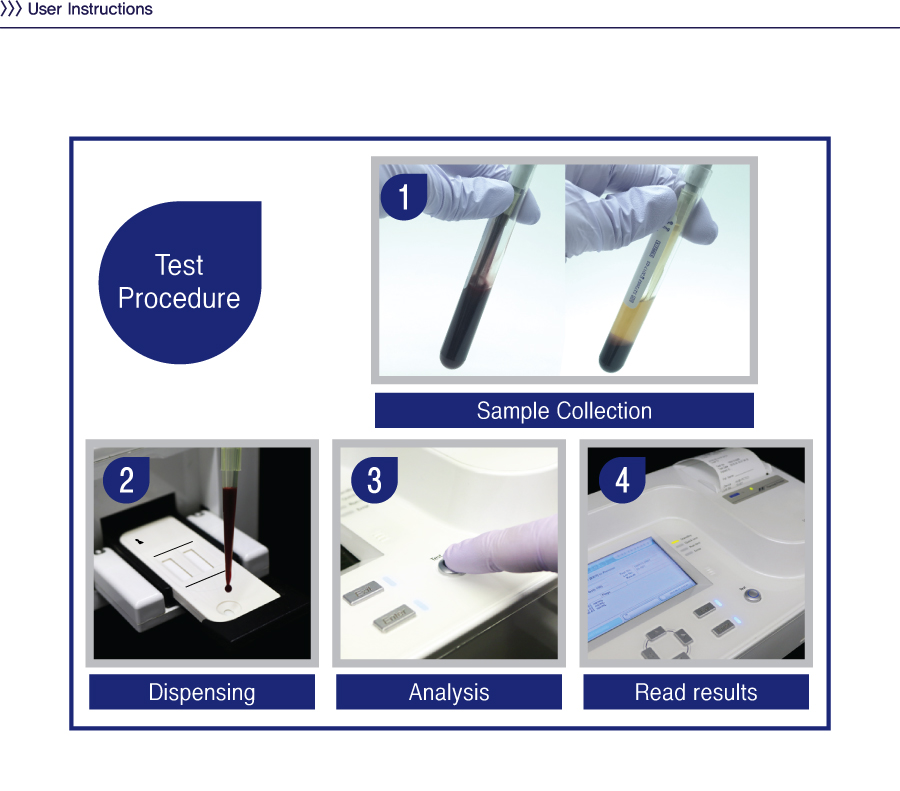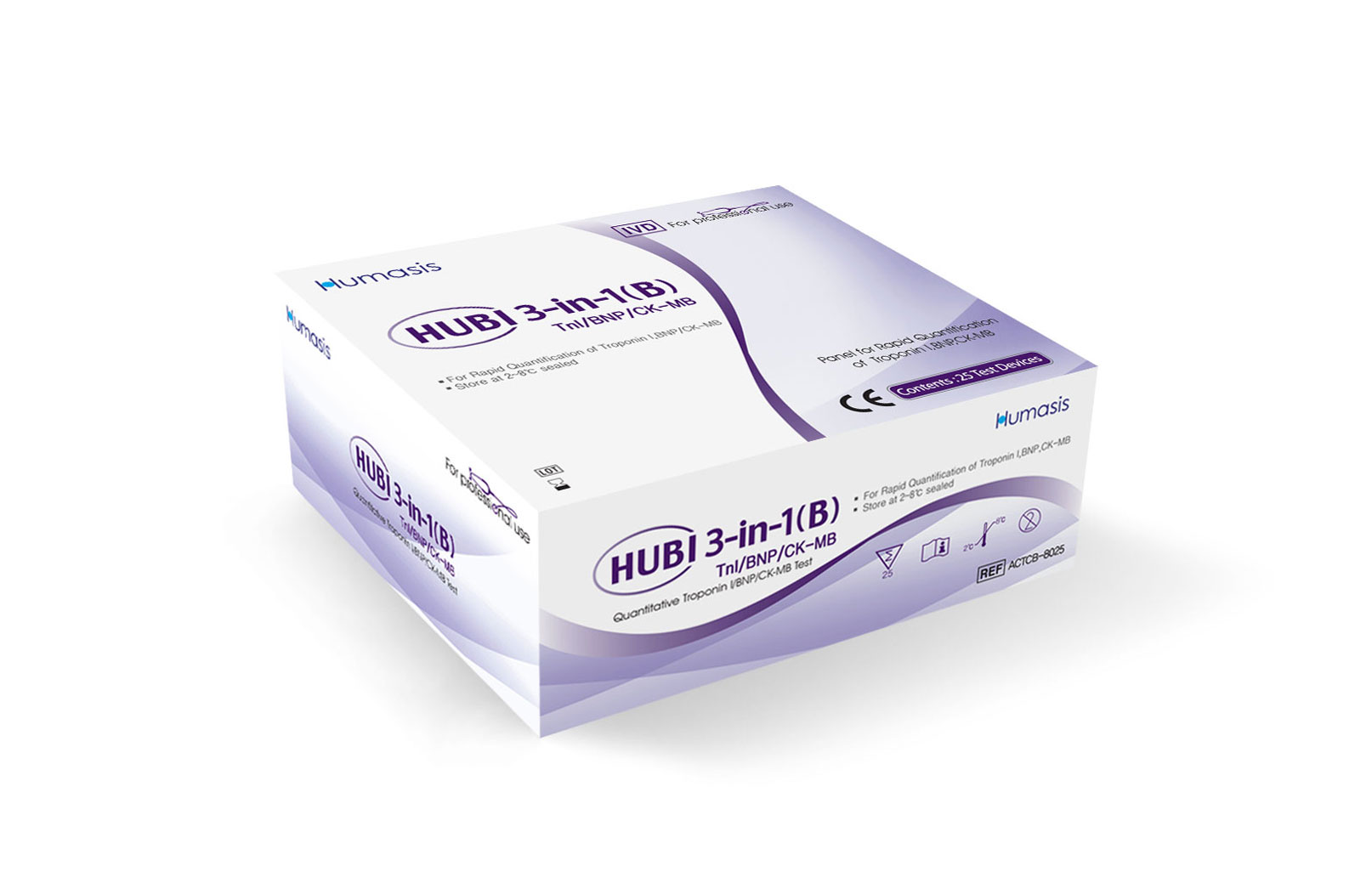Humasis
-
Company
Company Introduction
PR Center
- Product·R&D
- ESG
Product
HUBI Cardiac 3in1(B)(BNP/TnI/CK-MB)
Product Description
HUBI Cardiac 3in1(B)(BNP/TnI/CK-MB) is quantitative determination of CK-MB, BNP and cardiac Troponin I in human whole blood or plasma.
The Troponin complex, located on the myosin filament of the actinomyosin contractile apparatus of muscle. Troponin complex consist of Troponin T, which binds the Troponin complex to the tropomyosin strand, Troponin C, which binds calcium and regulates contraction, Troponin I, which inhibits myosin ATPase activity. There is one cardiac specific isoform of cTnl, with a molecular weight of 26.5kDa, cTnl becomes elevated 4~9 hours following an acute myocardial infarction (AMI) and remains elevated for about 6-10 days. Concentrations can increase 10~1000 times the upper limit of values founded in normal healthy subjects. Smaller increases may be found in patients presenting with unstable angina, sepsis, pericarditis, injury due to trauma etc. TnT is a 39kDa protein. There are a number of cardiac isomers of TnT which have 40~45% dissimilarity with skeletal muscle TnT. 6~8% of cardiac TnT (cTnT) is found in the cytoplasm and the remainder is found complexed in tropomyosin, cTnT becomes elevated 4~9 hours following an acute myocardial infarction (AMI) and remains elevated for about 8 days. Levels may increase more than 100 times the upper limit of values found in normal healthy subjects. Smaller increases may be found in patients presenting with unstable angina.
Creatine Kinase MB(CK-MB)is an 82,000 Dalton cytosolic enzyme that is present in high concentrations in the myocardium. In the cells, the "cytosolic" CK enzymes consist of two subunits, which can be either B (brain type) or M (muscle type). There are, therefore, three different isoenzymes: CK-MM, CK-BB and CK-MB. Isoenzyme patterns differ in tissues, CK-BB occurs mainly in tissues, and its levels do rarely have any significance in bloodstream. Skeletal muscle expresses CK-MM (98%) and low levels of CK-MB (1%). The myocardium (heart muscle), in contrast, expresses CK-MM at 70% and CK-MB at 25~30%, CK-BB is expressed in all tissues at low levels and has little clinical relevance. This isoenzyme of creatine kinase is frequently used in the diagnosis of acute myocardial infarction. Typically, CK-MB increase above normal within the first four to eight hours following acute myocardial infarction, reaching maximum concentrations between 12 and 24 hours and returning to normal in approximately three days. CK-MB is not specifically localization in cardiac muscle. Blood concentrations of CK-MB can be elevated as a result of acute or chronic muscle damage, including strenuous exercise and trauma. Nonetheless, measurements of blood CK-MB concentrations are widely relied on for the management of patients having an AMI.
Heart failure is an important clinical syndrome which compromises left ventricular systolic or diastolic function or a combination of both. Heart failure occurs when the heart is unable to pump blood at a rate sufficient for metabolic requirements. Its most common causes are coronary artery disease, hypertension, valvular heart disease and cardio-myopathies, Accurate and early diagnosis is important since effective therapeutic interventions are available, which improve both morbidity and mortality. Based on clinical signs and symptoms, the severity of heart failure is classified into four classes of increasing disease progression according to the New York Heart Association classification (NYHA class I-IV). The natiuretic peptide system is a family of structurally similar but genetically distinct peptides, which include atrial natriuretic peptide (ANP) and B-type natriuretic peptide (BNP) of myocardial cell origin and C-type natriuretic peptide (CNP) of endothelial cell origin. These peptides are characterized by a common 17 amino acid ring structure with a disulfide bond between two cysteine residues. The heart is the main source of circulating BNP in humans. The molecule is released into the blood in response to increased heart pressure. Various studies have demonstrated that increased levels of circulating BNP are found in early stages of CHF. The level of BNP in the blood continues to increase as the CHF disease advance. The HUBI-BNP test offers an objective, noninvasive measurement for assessing patients for CHF and risk factors in patients with acute coronary syndromes (ACS).
Order Information
| Product Name | Cat No. | Test Kit Type | Units | Sample Type | Shelf Life |
|---|---|---|---|---|---|
| HUBI Cardiac 3in1(B)(BNP/TnI/CK-MB) | ACTCB-8025 | Cassette | 25T/case | Whole blood or Plasma | 12 Months |
How to use

